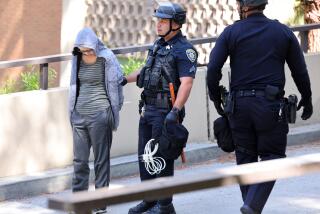UC Irvine Oversight Post Is Long Unfilled
A high-level UC Irvine administrative job created to improve oversight of the medical school has been vacant for more than two years after the person hired to fill it left, concluding that her role was “window dressing.”
Creating the position was the chief recommendation of a panel of experts who examined administrative failures at the school, in the wake of discoveries in 1999 that a staff member improperly sold spines from donated cadavers and returned cremated remains to the wrong people.
UC Irvine officials had touted the new job as a remedy to a managerial vacuum and said it would help them avoid problems and detect “high-risk situations earlier to convert them into low-risk situations,” Thomas C. Cesario, dean of the College of Medicine, told the campus newspaper.
The university is now facing a new round of scrutiny over its alleged mismanagement of the medical center’s liver transplant program, in which 32 people died waiting for operations even as the hospital turned down scores of organs. The issue, the latest in a string of controversies to plague UC Irvine’s medical programs in the last decade, is once again raising questions about why major problems continue to erupt.
Iris Ingram, a veteran administrator hired to fill the oversight position when it was created in April 2000, left after three years, convinced that the university’s desire to change was cosmetic.
“It was designed to take the heat off of everyone,” Ingram said in an interview this week in her lawyer’s Newport Beach office. “The minute they were in the clear, they were going to eliminate that position.”
“I was window dressing,” she later added.
Cesario declined to be interviewed. He issued a statement saying, “Any suggestions that the reforms put in place as of 2000 were anything less than professional, sincere and fully effective is proved wrong by the success of the [willed-body] program itself.”
UC Irvine has made nearly a dozen changes to tighten controls on its willed-body program since 1999.
A spokesman said the school could not comment on Ingram’s tenure, citing personnel issues.
Through the spokesman, Cesario said responsibilities for the oversight position were split between two other administrators: Mona Wapner, the chief financial officer, and James Herron, the associate dean of administration/corporate compliance officer, and that the university had not seen a need to fill the position.
Wapner and Herron served in similar posts when problems in the willed-body program came to light.
In the last decade, UC Irvine has been dogged by high-profile problems in its medical programs, most notably the illegal sale of cadaver parts from its willed-body program and fertility doctors who stole eggs and embryos from patients and implanted them in other women.
It has suffered a raft of lesser-known problems too. In 1997, cancer researchers improperly charged patients for experimental treatments; the following year, a professor used patients’ blood samples for research without seeking permission. Last year, a cancer doctor misspent as much as $2.3 million in state and federal funds on unauthorized software instead of cancer research the money was intended for.
In at least four cases over the last decade, investigations and an audit have cited poor oversight and a need for stronger controls over UC Irvine’s health programs.
The February 2000 task force report was issued after the problems in the willed-body program were discovered.
“It is imperative for UCI to carefully develop systems to catch circumstances quickly and deal with them effectively,” the report said. It observed that some department chairs were inexperienced and needed training to fix underlying problems and that others “exhibited a reluctance to accept the management responsibilities” they were expected to assume.
The panel’s No. 1 recommendation was to appoint a senior associate dean of administration to assist with oversight and accountability.
Before she was hired at UC Irvine, Ingram spent nine years at UCLA, first as a lecturer and then as an administrator in the School of Public Policy and Social Research. Before joining UCLA, she was a consultant for the accounting firm Deloitte & Touche and an administrator for the United Way. She also worked as an analyst for the city of Santa Monica and the state.
When Ingram was hired, UC Irvine announced that the move was intended to “improve the quality of oversight and management in the medical school.” Ingram said Cesario told her the university wanted a taskmaster who would enforce rules and “clean the place up.”
But the position carried a lower level of authority than the panel recommended. And unlike other administrators in the medical school dean’s office, she was on a year-to-year contract.
Ingram said the school was receptive to her efforts through most of her first two years, and she gained a reputation as the person who said no.
“It became a joke,” she said. “ ‘Iris is the heavy.’ ”
As time went on, university officials became less receptive to her recommendations for change, Ingram said.
Ingram now works in the California State University system chancellor’s office in Long Beach.
Panel members who made the recommendation to create the position hesitated to criticize the UC Irvine administration for its follow-through.
“There may have been additional positions somewhere else, or another way of covering the administrative slot,” said Joe Tupin, a panel member and former medical director of the UC Davis Medical Center. “Maybe time moves on and they made a different decision.”
Yolanda Medina, an attorney representing families that sued UC Irvine over the willed-body matter, said it was “unfortunate” that the oversight position remained vacant.
“Now, with everything else coming out, it seems to me that it’s a systemic problem of oversight and staffing,” Medina said. “It makes me wonder what else is brewing in other departments.”
More to Read
Start your day right
Sign up for Essential California for news, features and recommendations from the L.A. Times and beyond in your inbox six days a week.
You may occasionally receive promotional content from the Los Angeles Times.







